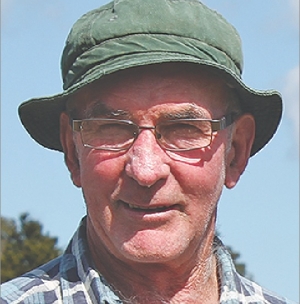John Glasson, Helensville, farms 54ha near Muriwai Beach, west Auckland, the site of the recent fatal shark attack. He and his wife milk 110 friesians and supply Fonterra.
For 30 years he’s been at the forefront of his South Kaipara Head and Helensville region’s mission to control TB but his first recollection of the disease’s impact on farming dates from way before that, in 1953, when 48 of his father’s 100 cattle tested positive, and were culled.
The Kaipara Dairy Company they supplied exported frozen cream to the United States so all supply herds were tested, he explained to Rural News.
But perhaps the horror of the disease was even more ingrained in the family psyche: a diary of his great great grandfather who lived near Liverpool shows three daughters died of whooping cough, then a son died of TB, probably from drinking untreated cow’s milk.
Glasson has been on his farm since 1970 taking over from his parents who moved there in 1964.
TB funding was cut in the 70s and 80s and “it started exploding and everybody started getting TB,” he recalls.
“They had to do something about it so they got a national programme going”.
Dairy herds in his region were still tested because of the cream exports, but testing began on beef herds. At one stage all but one herd in the South Kaipara Head region tested positive. The area was declared infected and herd movement controls began.
Glasson went to a meeting where Animal Health Board (AHB) TB eradication and research manager Dr Paul Livingstone s spoke. “What amazed me was he said when it gets into the possum it increases in potency and one drop of pus from a TB possum could infect every cattle beast in New Zealand – that was in 1988”.
They formed a TB committee in Auckland, which he joined as Federated Farmers’ dairy delegate and he has served ever since.
Glasson refuses to blow his own trumpet about his involvement in TB eradication but admits he “was always keen to go on the committees because it was a way of keeping a handle on what was going on.
“The main thing is that South Kaipara Head no longer has TB – we got rid of it through the cooperation of all the farmers, the regional council, the Animal Health Board and DOC.”
Although deer farms were not subsidised for testing, the local deer farmers got involved in 1988 and quickly got it out of their herds. The last TB detected in any animal in the region was 2003.
Although possums or ferrets were probably the initial source of infection, Glasson does not believe a lot of TB was detected in the local pests.
“What happens is that TB comes in on the back of a truck.” In the recent Northland outbreak, herd numbers were being doubled on that farm and stock was brought in from throughout New Zealand.
He’s no great fan of the NAIT scheme, but Glasson says it will help with traceability as calves have to be tagged from four days.
South Kaipara Head has a well-known deer representative on the TB committee and Glasson is keen that there’s a dairy representative involved too, so he’s hopeful someone will stand in his place.
TBfree NZ says Glasson’s local knowledge was invaluable in helping the regional council and AHB control TB in the area. His relationship with the local community made him a valuable member of the TBfree Auckland Committee.
So now TB is well under control, is there a danger of complacency?
Glasson says you only have to look at Northland to see “it can happen just like that.”
“You have to be constantly on alert where you buy your cattle from.”

















